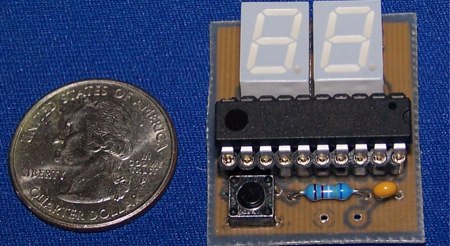
All praise to [Limor] for uncovering this incredibly odd project. [magician]’s perceptual chronograph is designed to test whether time “slows down” in stressful situations. The device flashes a random number on the display very quickly so that it is impossible to perceive what is actually being displayed. If you can read the number while under stress, it means that your ability perceive time has increased. It’s hard to believe, but check out the video embedded after the break that investigates the phenomenon. We can’t help, but wonder how [magician] personally plans on testing this.
















I’ve seen the video before, and its a very cool experiment. The problem is, what to do with it…!
Next time we are running out of time on the planning we hang people with laptops on bungee-ropes?
I can’t help but wonder if the guy would have gotten both sets of numbers correct if the way in which the number was displayed were a bit easier to read… I mean seriously, that inversing font thing was bleh even at slow speed.
stay with it till the end folks. stoned lab rat. ha. ha. ;)
human overclocking.
This is very cool – reminds me of some kind of steampunk experiment :)
Is this Michio Kaku narrating?
What did you expected? Time is just illusion. As gijs said – time perception is dependent on clock frequency of our brain.
It’s a nice project, but a flawed premise. Your perception of time may slow down, but there is no reason to expect that the flicker fuse frequency would change.
My only question is how we can speed up the clock of our brain.
How cool is this!
Yogi’s and meditators in East have been talking about this for eons though. They say you can alter your perception of time and reality through meditation, the deeper you go into the mind, the deeper your perception of reality…
The Discovery channel did something on this in their Human Body series, seems to work…., they tested it with people bungee jumping for the first time.
The rat on weed just made my day. Absolutely hilarious!
I have another observation on this. I’ve noticed that after I’m done running, that the pitch of the songs on my music player has lowered, and the songs all sound a little slower. I always thought this was some auditory illusion (or totally psychosomatic), but could it be due to the fact that I’m experiencing time slower due to a heightened heartbeat?
Time IS an illusion, Lunchtime doubly so.
~very deep, they have a column in Reader’s Digest for people like you~
The rat on marijuana’s perception of time didn’t slow down, he just forgot what he was supposed to be doing. :)
dr – that’s exactly the point. the clock doesn’t actually slow down, but your brain speeds up, therefore you are able to perceive what it’s displaying because it _appears_ to be flashing slower.
@dr – why not? It certainly changes with fatigue, so why not other factors?
Hey! Neato, my project made it to Hackaday!
@Diddle, yeah that’s what I was thinking, so I decided to try it for myself, I’m wondering if it wouldn’t be easier with the word rather than numbers. I built a four character display, so I may try that. Be sure to see the newest versions here:
http://www.ladyada.net/forums/viewtopic.php?t=6119
They just keep getting better!
Again, thanks for the feedback, everyone!
This has kind of been investigated before. Not read the whole article yet so maybe im repeating stuff. A guy used very similar test – instead of numbers flashing, simply a light which seems to be ‘on’ but infact flickers faster than eye can percieve (like a strip light). He did a parachute jump (i think) and sure enough, he could then percieve the light flickering (he built the light into a wrist strap)…
One of the fastpitch women’s softball teams (US olympic, I believe) marks balls with colored numbers and then uses a machine to pitch them at high velocities. Their intent was to train their team to see the ball at speed clearly enough to first discern the color of the markings and then to see the number. They succeeded.
I am dubious of this experiment; vision and comprehension is subject to training.
It’s a cool idea and the test looks impressive, but there are so many other explanations of why he could see the numbers the while he was falling. The fact that this effect was repeated despite a practice run also confounds the test.
I believe the ‘life under threat’ condition could be more accurately manipulated, and that the measurement of time passing should be done automatically. If time really does slow down even in the subject’s specific locality, than an automatic timer would be able to determine this if attached to the subject.
I understand the point of this experiment is to suggest that perception of time changes (which has been shown fairly conclusively already), but I think the conclusions the video hints at are unfounded and somewhat misleading.
Fair play to Jessie for keeping his eyes focused on the device whilst falling backwards at such a speed. Quite a task in itself.